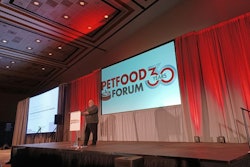
After attending Petfood Forum a few years ago, one executive with meat processing equipment maker Marel decided on the value of moving the company into pet food production machinery.
“We could see applications for some of the machinery we have on the meat side,” Jesper Hjortshoj, vice president of business development for Marel, said in an interview from his company’s booth at this year’s edition in Kansas City, Missouri on May 4. “I would say Petfood Forum was actually one of the decisive reasons for why we went into pet food.
In late April, Marel agreed to acquire Wenger Manufacturing, a processing equipment manufacturer focused on pet food, plant-based proteins and aqua feed. The acquisition is subject to customary closing conditions such as anti-trust and approval of Wenger’s shareholders, but Hjortshoj expects those to go well.
When he was EVP of Marel food processing activities, Hjortshoj attended Petfood Forum. After that, he discussed entering the dog, cat and other pet food industries with Marel’s CEO.
“Listen,” he said to the CEO. “This is a market we have to go into.”
Then Marel spent several years analyzing the pet food industry, coming to understand valuation within the market.
“A lot of our customers on the animal protein side also move into pet food,” Hjortshoj said. “In the old days, they would take the off cuts of the slaughtering line and make hot dogs out of it. Now they do pet food, because the valuation of the raw material is much higher. We decided to go into that…
“We initially approached Wenger some years ago, to get closer to them. We could see that they were a very interesting asset for someone like us that grows both organically and by acquisitions. When Wenger came up for sale, it was a phenomenal opportunity for us to go in and initiate that dialogue.”
Marel to acquire Wenger
Marel executives consider Wenger to be a platform acquisition.
“This is the platform for us to go into these adjacent markets: pet food or aquafeed, but also plant-based proteins whether they be cell-cultured or fermented or just made from grains or from soy or from wheat or from plants. We share some customer relationships.”
For example, Tyson produces for McDonald's, he said. The same machinery that produces a chicken nugget makes a veggie nugget. Hjortshoj sees a lot of consumer interest in meat alternatives, especially plant-based proteins.
“That is based on the same technology that we use in pet food,” he said. “We get almost like a three in one with this acquisition.”

















